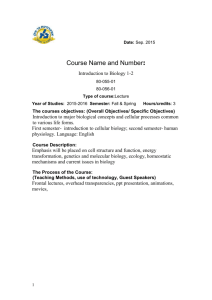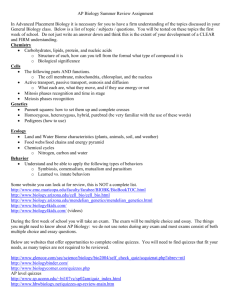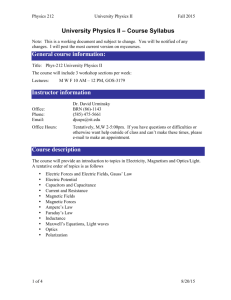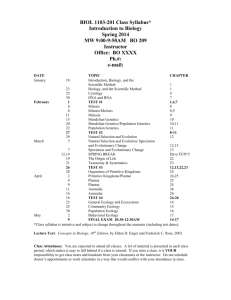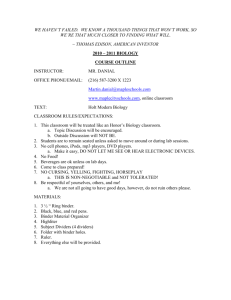Biology 122 Genetics and Evolution Spring 2008 Dr. Daniel (Max
advertisement
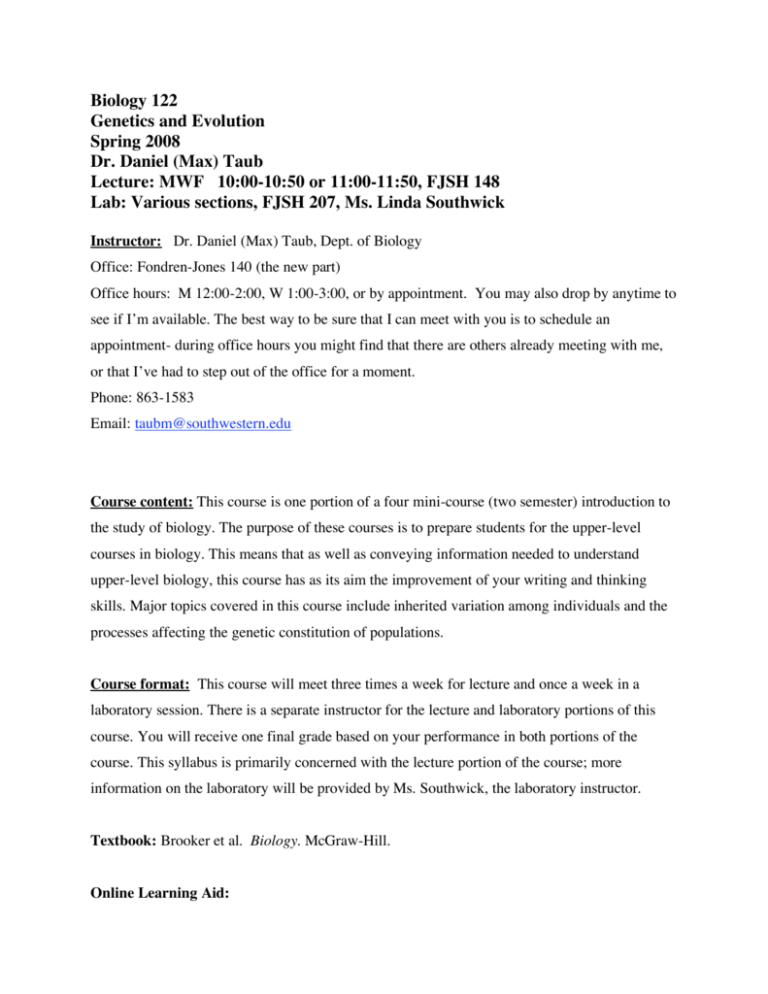
Biology 122 Genetics and Evolution Spring 2008 Dr. Daniel (Max) Taub Lecture: MWF 10:00-10:50 or 11:00-11:50, FJSH 148 Lab: Various sections, FJSH 207, Ms. Linda Southwick Instructor: Dr. Daniel (Max) Taub, Dept. of Biology Office: Fondren-Jones 140 (the new part) Office hours: M 12:00-2:00, W 1:00-3:00, or by appointment. You may also drop by anytime to see if I’m available. The best way to be sure that I can meet with you is to schedule an appointment- during office hours you might find that there are others already meeting with me, or that I’ve had to step out of the office for a moment. Phone: 863-1583 Email: taubm@southwestern.edu Course content: This course is one portion of a four mini-course (two semester) introduction to the study of biology. The purpose of these courses is to prepare students for the upper-level courses in biology. This means that as well as conveying information needed to understand upper-level biology, this course has as its aim the improvement of your writing and thinking skills. Major topics covered in this course include inherited variation among individuals and the processes affecting the genetic constitution of populations. Course format: This course will meet three times a week for lecture and once a week in a laboratory session. There is a separate instructor for the lecture and laboratory portions of this course. You will receive one final grade based on your performance in both portions of the course. This syllabus is primarily concerned with the lecture portion of the course; more information on the laboratory will be provided by Ms. Southwick, the laboratory instructor. Textbook: Brooker et al. Biology. McGraw-Hill. Online Learning Aid: This semester we have access to an online resource that provides quizzing on topics relevant to this course. Signing up is free and quick, and I strongly recommend that you sign up and use this resource. It is called Prep-U and you can sign up at: http://www.prep-u.com/signup You will need the class code: taub72 I will create “assignments” for you on different topics. These are not assignments in the sense that you are required to do them, but these are items that I have chosen from their online database because they are relevant to our course. Other required items: You will need to bring a calculator to class and to exams, because we will be doing quantitative problem solving during some of the class periods, and for the quizzes and exams. This is particularly true for the last third of the course. The calculator needs to be able to do square roots. Course Policies: Grades: You will receive one grade for the lecture and laboratory portions of this class combined. 450 points are allotted to the lecture portion of this course (out of 600 total). Points for the lecture portion of the course will be calculated in two ways (A & B), and you will receive the higher of the two point totals. The purpose of this is so that the short quizzes can only help, not hurt, your grade. Grading scheme A : Grading scheme B: Two mid-term exams, each 126 points Final Exam 189 points Class participation Total 9 points 450 points Two mid-term exams, each Final Exam Quizzes Class participation Total 98 points 147 points 98 points 9 points 450 points Point Total 582 – 600 558 – 581 540 – 557 522 – 539 498 – 521 480 – 497 462 – 479 438 – 461 420 – 437 402 – 419 378 – 401 360 – 377 <360 points Grade A+ A AB+ B BC+ C CD+ D DF Exams: There will two midterm exams during the semester, and a final exam. The final exam will cover material from the entire course. While the mid-terms will focus on particular portions of the course, material in any portion of the course may build on material earlier in the course. The exams will be comprised of a variety of question types including multiple choice, matching, problem-solving, short answer and essay questions. Class Participation: Class meetings may include problem solving as well as lecture. A portion of the grade for this class will be based on class participation. This will be based on my perception of your overall contribution to the in-class experience. You cannot participate if you miss class, so attendance will be a factor in this portion of your grade. Quizzes: There will be very short quizzes (approximately 1- 3 questions) at the end of most classes. These will cover material only since the previous quiz (including from that day’s class) so you can have immediate feedback as to how well you got the main points of the class. These quizzes can only help, and cannot hurt, your grade. Attendance Attendance is required for all lecture and laboratory meetings. If exceptional circumstances require absence from class, arrangements must be made with the instructor ahead of time. Accommodations for disabilities: Appropriate accommodations will be made for students with disabilities in accordance with University policy. All students requesting such accommodations must consult with the Office of Academic Services. For special accommodations for exams, students must make arrangements with Academic Services at least three weeks prior to the exam. Honor system All work is covered under the honor code. All suspected violations will be taken seriously and dealt with under the approved procedures as found in the Student Handbook. Drop Dates: Because this course continues for one half semester, the timing for drops without record and drops with a W is different than for full semester courses. April 1 is the last date to drop without a record, and April 17 is the last date to drop with a W. 3/7 Date Topic Intro/ Precursors to Darwin Reading Chapter 23, 479-483 3/10 Logic of Natural Selection Chapter 24, 483, 504-505 3/12 Traces of evolution Chapter 23, 483-492 3/14 Population dynamics Chapter 56, 1207-1211 3/24 Life histories 3/26 Interactions among species Chapter 56, 1201-1202 (reproductive strategies), 12031204 (survivorship curves),12111212, 1229 (Lynx-Hare) Chapter 57, 1219-1234 3/28 Meiosis 3/31 Topics in Populations 4/2 Mendelian Genetics 4/4 Brown Symposium/ No class 4/7 4/9 4/11 Chapter 15, 299-300, 312-318 (through section on “Natural variation exists in chromosome structure and function”) Chapter 16, 325-336 Mendelian genetics Molecular genetics Chapter 12, 231-236, 241-242 Beyond Mendelian genetics Chapter 16, 341- 346, Chapter 17, 349-352, 357-359 Chapter 17, 353-357 4/14 Linkage 4/16 Chapter 16, 337-340, Chapter 15, 318- 323 4/18 Sex- determination/sex linkage/chromosomal errors No class 4/21 Human genetics Chapter 16, 336-337 4/23 Topics in Genetics 4/25 Intro to Population Genetics Chapter 24, 499-502 4/28 Evolution in populations Chapter 24, 502-506,510-514 4/30 Group selection Chapter 55, 1189-1193 5/2 Topics in natural selection . Apr 2, 6 PM Exam 1 Apr 24, 6 PM Exam II May 8, 8:30 AM (11:00 section) May 9, 8:30 AM (10:00 section) Final Exam Cumulative with a strong emphasis on Last Part The information in this syllabus is provisional, subject to change as needed.
